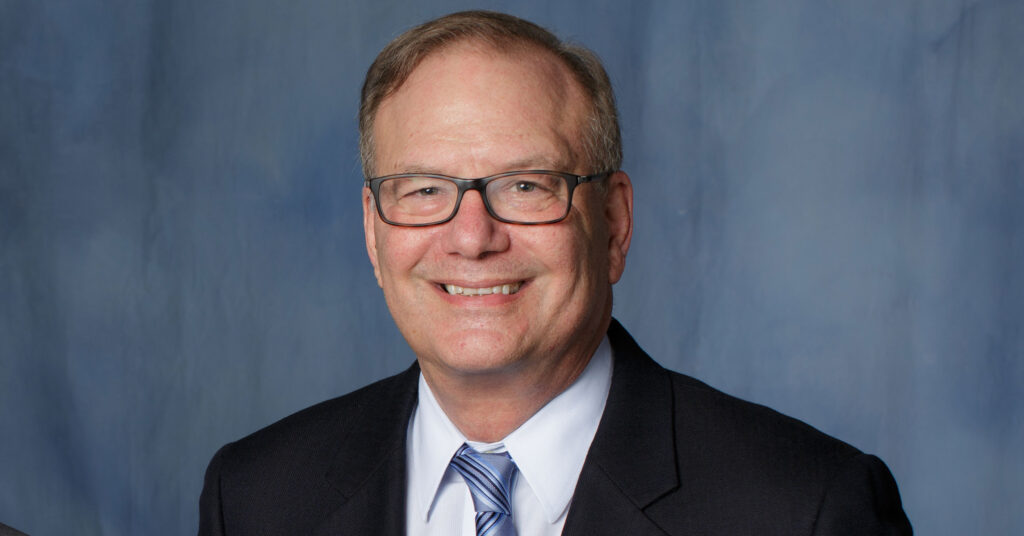UF neurologist earns Alzheimer’s Association Lifetime Achievement Award

Courtesy of UF Health
BY TODD TAYLOR
Internationally-renowned neurologist Steven T. DeKosky, M.D., the deputy director of UF’s Evelyn F. and William L. McKnight Brain Institute, was honored on July 27 with the Henry Wisniewski Lifetime Achievement Award during the 2020 Alzheimer’s Association International Conference.
The award recognizes significant contributions to Alzheimer’s disease and dementia research, either through a single scientific discovery or a body of work. Wisniewski, the former director of the New York State Institute for Basic Research in Developmental Disabilities, is considered “one of the grandfathers of modern Alzheimer’s research.’’
“I feel humbled and very grateful for this honor as well as awed by the list of previous recipients, many of whom were mentors, collaborators, and friends, including Dr. Wisniewski himself,” DeKosky said in a video-recorded acceptance for the conference. “The studies any dementia researcher does aren’t possible without smart, motivated colleagues and research staff both in the laboratory and in the clinic … I accept this award for all of us.”
DeKosky is the Aerts-Cosper Professor of Alzheimer’s Research in UF’s department of neurology and associate director of the 1Florida Alzheimer’s Disease Research Center. His basic research has centered on structural and neurochemical changes in the human brain in aging and dementia and the effects of traumatic brain injury, or TBI. His clinical and translational research has focused on understanding the genetics, neuropsychiatric symptoms, neuroimaging, and treatment and prevention of Alzheimer’s.
“Dr. DeKosky has had a major impact on Alzheimer’s disease and related dementia fields and has remained committed to combating the Alzheimer’s epidemic for over four decades,” said Todd E. Golde, M.D., Ph.D., director of UF’s McKnight Brain Institute. “Throughout his career, he has been an advocate for Alzheimer’s research and has served as a leader and mentor for countless researchers. I can think of few individuals with a greater dedication to this cause.”
DeKosky’s basic science studies have found that the decrease in the number of synapses — the points of communication between neurons — is the major correlate of cognitive decline in Alzheimer’s, and have identified the synaptic regenerative efforts of neurons in the early stages of mild cognitive impairment. He was principal investigator of the clinical trials investigating Pittsburgh Compound-B, or PiB, the first amyloid imaging compound and a crucial tool for Alzheimer’s research.
DeKosky directed an eight-year, National Institutes of Health-funded, multicenter Ginkgo biloba trial, which showed that the medicinal herb could not prevent or delay onset of dementia in healthy elderly adults. It was the first large study focused on the prevention of dementia/Alzheimer’s and remains the benchmark in assessing drugs’ ability to slow or prevent dementia.
He also co-authored the first reports of chronic traumatic encephalopathy, or CTE, in professional football players, which stimulated interest and concern for brain injury from chronic repetitive head trauma in patients, families, the armed forces, and sports organizations.
DeKosky has published over 500 primary papers and reviews and 25 book chapters, and his publications have been cited over 82,000 times. He is ranked among the dementia clinician-researchers with the highest sustained impact. In 2018, he was named among Clarivate Analytics’ 2018 Highly Cited Researchers, recognizing those with the top 1% most-cited works in their field between 2006 and 2016.
DeKosky has served on and led numerous NIH review and advisory committees and taught and mentored in clinical research training programs sponsored by the National Institute on Aging and the National Institute of Neurological Disorders and Stroke. DeKosky is a frequent commentator on Alzheimer’s and brain aging for the lay media and a frequent lecturer on Alzheimer’s nationally. He has testified multiple times before U.S. Senate committees for greater research funding for Alzheimer’s and met with government officials in other countries as a consultant and advocate for programs and support for people with dementia.
“Through all of the research he has authored, co-authored, or inspired, Dr. DeKosky’s commitment to impact the lives of those fighting Alzheimer’s disease and other dementia conditions is unparalleled,” said Michael S. Okun, M.D., chair of the department of neurology in the UF College of Medicine. “In my mind, his greatest impact is the tens of thousands of lives he has touched. He has defined for us what a dedicated patient and family advocate should look like for Alzheimer’s disease.”
After receiving his bachelor’s degree from Bucknell University, DeKosky attended UF for graduate studies in neuroscience and psychology. He then graduated from the UF College of Medicine and completed an internship in internal medicine at The Johns Hopkins Hospital and a three-year residency in neurology at UF. DeKosky completed a postdoctoral fellowship in neurochemistry at the University of Virginia.
DeKosky co-founded the Alzheimer’s Disease Center at the University of Kentucky College of Medicine and served as division chief of geriatric psychiatry and chair of neurology at the University of Pittsburgh. He also directed the Alzheimer’s Disease Research Center at Pittsburgh and served as vice president and dean of University of Virginia School of Medicine before returning to UF in 2015.
